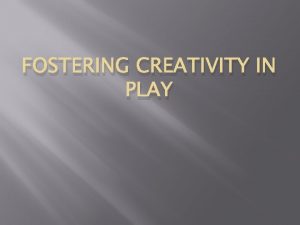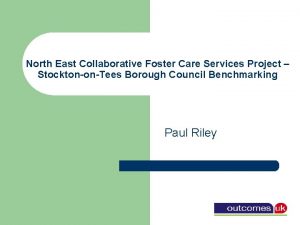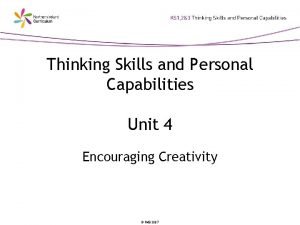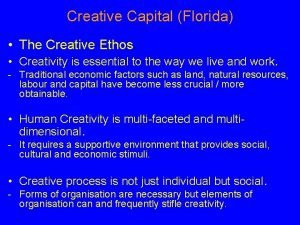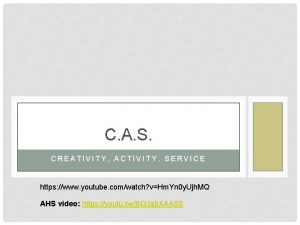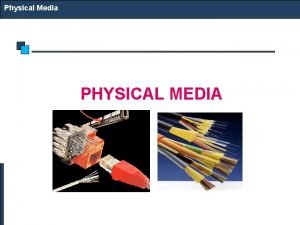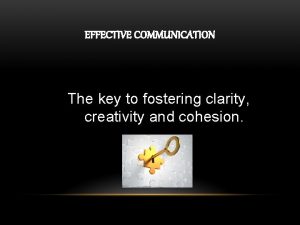FOSTERING CREATIVITY IN PLAY Purposes of Play Physical















- Slides: 15

FOSTERING CREATIVITY IN PLAY

Purposes of Play � � � Physical development Outdoor play connects typical and atypical children to nature and their environment Cognitive skills – Piaget & Vygotsky believed that imaginative play is one of the purest form of symbolic thought Language development Dramatic play Games with rules

� � � Expression of feelings Independence Divergent thinking

Piaget’s Stages of Play � � Functional Play (0 -2) – the child engages in repetitive activities Constructive Play (2 -4) – learning to use simple materials to satisfy a purpose Dramatic Play (4 -7) – assigning roles and taking upon the roles Games with Rules (7 -11) – understanding rules and learn how to cooperate

Parten’s Stages of Play � 1. Unoccupied behavior – during infancy, a child occupies himself by watching anything of momentary interest

� 2. Onlooker play – young toddlers focus on the activity rather than the environment

� 3. Solitary play (toddlers) – the child plays alone without the regard to what other children are doing

4. Parallel play (ages 2 -3) – a child sitting next to another child, playing with the same toys, but in a different way. It is the early stage of peer interaction, but the focus is on the object rather than another child

5. Associative play (ages 3 -4)- a child goes in and out of the play with other children, uses same toys and participates in the same activity, but in his own way

6. Cooperative play (ages 4 and up) – group play that involves organized ideas, assigned roles, taking turns, making friends, organizing games and activities

Factors Likely to Facilitate Creative Play Teacher-Directed Play � Child-Initiated Play with teacher support � Teacher intervention in play Practical ways to stimulate and extend play � Ask questions � Make suggestions � Provide plenty of time for play � Use language to Enrich play � Make a special point of including children who have disabilities �

Cast yourself in the role of assistant to the child as you help play emerge � � � Move with the child’s play – sense what will enhance the play and offer suggestions Put yourself in the position of the child Put children in command of play

� � � A rich background of actual life experience is fundamental to developing creative play – fieldtrips, experiences with many ethnic groups, books and visitors will enrich their imagination Offer many opportunities for outdoor play Equipment plays an important role in facilitating play – include open-ended materials that can be used in a variety ways (boards, blocks, ladders) Rotate the materials frequently and rearrange them in a appealing and complex ways Store materials in convenient, easy-to-reach places

Specific Activities to Encourage Creativity in Play Creative dramatic play – add variations Importance of Block play: � Emergent perceptual-motor skills – stacking, reaching, grasping, lifting, carrying, balancing � Emotionally satisfying block play – help children feel strong and masterful and creative � Visual-spatial relationships � Cognitive development �

� � � Water play Mud and sand Computer and digital screen play
 Creativity and play fostering creativity
Creativity and play fostering creativity Fostering teamwork
Fostering teamwork Fostering hope scholarship
Fostering hope scholarship Fostering in doncaster
Fostering in doncaster Fostering stockton on tees
Fostering stockton on tees Fostering healthy solutions
Fostering healthy solutions How pixar fosters collective creativity
How pixar fosters collective creativity Critical and creative thinking capability
Critical and creative thinking capability Icedip model full form
Icedip model full form Usc kortschak center for learning and creativity
Usc kortschak center for learning and creativity Creative capital definition
Creative capital definition Creativity in psychology
Creativity in psychology Communication creativity critical thinking collaboration
Communication creativity critical thinking collaboration Creativity and personal mastery
Creativity and personal mastery It for higher thinking skills and creativity
It for higher thinking skills and creativity Cas creativity ideas
Cas creativity ideas
